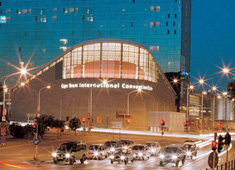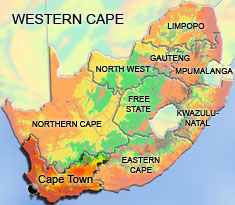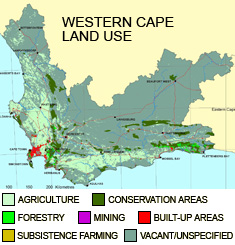Investing in the Western Cape
Economic development in the Western Cape is characterised by a broad sector base,
with good growth potential in several major sectors, a range of significant niche
sectors and a number of large new investment projects.
Rapidly decreasing communication cost levels mean the disadvantages of Cape Town's
distance of 1 500 kilometres south of the economic hub of Gauteng and several
thousand kilometres from European, American and Asian centres is less and less
significant.
In line with worldwide trends, South Africa's export-oriented industries tend to shift
towards port cities and coastal industrial belts - the drop in import duties and the
establishment of Saldanha Steel as a basis for Western Cape heavy industry add more
momentum to this shift.
The Western Cape has an open economy with foreign trade making up close to 30% of
the gross regional product. The province's exports have traditionally been dominated
by primary products such as fruit, fish and
vegetables, but with beneficiation adding
increasingly higher value.
 Wesgro
Wesgro
Wesgro is the official investment and trade promotion agency for the Western Cape,
the first point of contact for foreign importers, local exporters and investors wanting
to take advantage of the business potential of Cape Town and the province as a
whole.
The agency works closely with key players such as the South African government,
business, labour, the City of Cape Town, district
municipalities and rural local
authorities. Its key objectives are:
- To market the economic potential, the advantages and investment opportunities
of the Western Cape, both within South Africa and internationally.
- To maintain and increase economic momentum and confidence in the Western
Cape.
- To gain recognition for the Western Cape as a dynamic development region.
Key projects
In the regional development of the Western Cape a number of large investment
projects have lately played an important role in maintaining growth and employment
momentum.
Some major projects are currently in the process of implementation, with ample
opportunities for further investments in each of these cases. These include the Cape
Town International airport, Cape Town central station, jewellery emporium, Kudu Gas
(Cape Power Project), perlemoen (abalone) project,
Philippi east town centre,
refrigerated container plant, Robben Island gateway centre, Roggebaai canal, Sandy
Cove and the Zeconi optical fibre plant.
Tourism
The Western Cape's beauty is unsurpassed and it is a top international tourist
destination. Some 50% of international tourists arriving in South Africa visit the
Western Cape, while the overall share of the region in South Africa's tourism market
is
approximately 24% by gross expenditure.
Estimates for the different components of the Western Cape's 8-million annual tourists
clearly show the dominance of local tourists – 46% from other provinces and 39%
from inside the Western Cape - as compared to 14.3% foreign tourists. In the latter
category, tourists from elsewhere in Africa have reached about half the number of
foreign arrivals.
The tourism industry is a major growth sector in terms of investment, employment
and the diversification of services. Less directly, tourism stimulates the property
market - especially prime residential and cluster projects – and strengthens business
contacts, often are the forerunners of trade, joint ventures and immigration plans.
Agriculture and fishing
The
sheltered valleys between mountains are ideal for the cultivation of export-grade
fruit such as apples, table grapes, olives, peaches and oranges. A variety of
vegetables is cultivated in the eastern part of the Western Cape, while the wheat-
growing Swartland and Overberg districts are the country's breadbasket.
The agricultural sector is critical for the Western Cape economy, accounting for 60%
of regional exports. Since the 1990s the sector has steadily expanded, with only
moderate fluctuations due to late winter rains, shifting world market prices and other
unforeseeable factors related to specific product segments.
South Africa's 300-year-oldwine industry is based in the south of the province. The
region produces 3.1% of the world's wine and ranks as number nine in overall volume
production, with 100 200 hectares under vines for wine production.
Some 75% of all South African fishing taking place along the Western Cape coastline.
The rich fishing
grounds on the west coast are protected from exploitation by a 200km
commercial fishing zone and a strict quota system. Snoek, Cape lobster, abalone,
calamari, octopus, oysters and mussels are among the delicacies produced in these
waters.
Key exports are also fruit, wine, wool and ostrich. The high quality of exports,
combined with the relative weakness of the local currency, makes the products some
of the most affordable high quality exports in the world.
Manufacturing
In the past the strength of Cape manufacturing largely depended on the performance
of the food processing sector as well as clothing and textile industries. Several other
segments made relatively small, yet significant contributions to the sector, like the
petrochemical and plastics industry, furniture, printing and publishing.
The establishment of the R9-billion Saldanha Steel Project (SSP) is expected to
gradually expand the base of Western Cape industry, helping create downstream
processing plants. The rise of information technology, telecommunications, medical
and research equipment and other hi-tech processes will further broaden the industrial
core of the Western Cape. The Capricorn Science and Industrial Park in the beach
town of Muizenberg one of a number of catalysts.
Financial services
Cape Town is the second largest financial centre in the country. The province has in
the past relied largely on the insurance industry as the backbone of this sector.
While this sector still expands, a stronger momentum seems to come from the
establishment of new, specialised financial service suppliers in the area, either as
branches of Gauteng head office, or as a shift of certain of the activities to the more
attractive working environment of the Cape. This trend includes foreign firms, and
new investment groups focusing on the local investment scene.
Parallel to the steady expansion of financial services and retailing, dominated by the
expansion of a few retail mega-centres, there is also a boom in professional,
business, property and personal services. In particular the property services sector
has experienced dramatic growth.
Business process
outsourcing
A rapidly expanding sector showing good potential in the Western Cape in particular is
business process outsourcing, which includes the processing of accounts and claims,
as well as front office activities such as call centres. This growth is fuelled by world-
class service levels of call centre staff, time-zone compatibility with Europe, high
rates of fluency in English coupled with neutral English accents, a favourable exchange
rate and an advanced telecommunications industry.
Investment agency Calling the Cape has facilitated call centre deals in the Western
Cape worth R933-million since the beginning of 2004, with investments in 2005 up by
19% over 2004. Some 79% of this investment originated from the UK, with companies
from Canada, Germany, the Netherlands and the US also represented.
Companies running call centres in the Western Cape include Barclays, JP Morgan,
Lufthansa, the Budget Group, Merchants/Asda, Dialogue and STA Travel.
Research published in November 2004 by independent analysts Datamonitor predicted
that South African call centre numbers would double by 2008 - and rated Cape Town
ahead of India for quality of service.
Download the Department of Trade and Industry's
Provincial Economic
Overview (1.8 MB)
here.
SAinfo reporter
 Wesgro
Wesgro is the official investment and trade promotion agency for the Western Cape,
the first point of contact for foreign importers, local exporters and investors wanting
to take advantage of the business potential of Cape Town and the province as a
whole.
The agency works closely with key players such as the South African government,
business, labour, the City of Cape Town, district
municipalities and rural local
authorities. Its key objectives are:
Wesgro
Wesgro is the official investment and trade promotion agency for the Western Cape,
the first point of contact for foreign importers, local exporters and investors wanting
to take advantage of the business potential of Cape Town and the province as a
whole.
The agency works closely with key players such as the South African government,
business, labour, the City of Cape Town, district
municipalities and rural local
authorities. Its key objectives are:
 The Cape Town International Convention Centre, in the heart of the Western Cape capital (Image: CTICC)
The Cape Town International Convention Centre, in the heart of the Western Cape capital (Image: CTICC)
 The Western Cape takes up 10.6% of South Africa's total land area (Image: Mary Alexander)
The Western Cape takes up 10.6% of South Africa's total land area (Image: Mary Alexander)
 Map: Department of Environment and Tourism
Map: Department of Environment and Tourism










